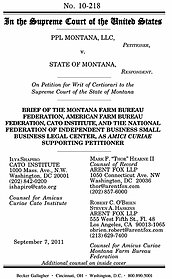PPL Montana, LLC v Montana
Learn more about Cato’s Amicus Briefs Program.
For over a century, Montana citizens have used non‐navigable streambeds along their properties for various purposes without objection from the state government. The hydroelectric energy company PPL Montana and thousands of other private parties exercised their rights over these non‐navigable stretches that the state never claimed. Last year, however, the Montana Supreme Court overturned well‐settled state property law by effectively converting the title in hundreds of miles of riverbeds to state ownership. The majority of the court ruled that the entirety of the Missouri, Clark Fork, and Madison rivers were navigable at the time of Montana’s statehood, producing a broad holding that eradicates the right to use rivers and riverbanks that Montanans had enjoyed for over a century. PPL Montana thus asked the U.S. Supreme Court to review the state court’s decision; Cato filed an amicus brief supporting that request, which the Court granted. Now that the case is before the Court, Cato has joined the Montana Farm Bureau Federation, American Farm Bureau Federation, and National Federation of Independent Business on a brief supporting the property owners. We are chiefly concerned with two parts of the Montana Supreme Court’s ruling: First, the court incorrectly evaluated navigability for the purpose of establishing title — finding the entirety of the rivers at issue navigable (and thus belonging to the state) because portions of them are — contravening the legal standard established by the U.S. Supreme Court in United States v. Utah (which analyzed the riverbeds section‐by‐section to achieve a “precise” assessment of navigability). Second, the court effectively transferred a substantial quantity of land from private owners to the state — a judicial taking that violates either the Fifth or Fourteenth Amendments (as the Court described in the recent Stop the Beach Renourishment case, in which Cato also filed a brief). In short, the Court should reaffirm the Utah standard for navigability in the context of establishing title and protect private property owners against judicial takings. By doing so, it would send a strong message to state courts across the nation that judicial usurpations of property rights are just as unconstitutional as those undertaken by other branches of government.

This work is licensed under a Creative Commons Attribution-NonCommercial-ShareAlike 4.0 International License.

